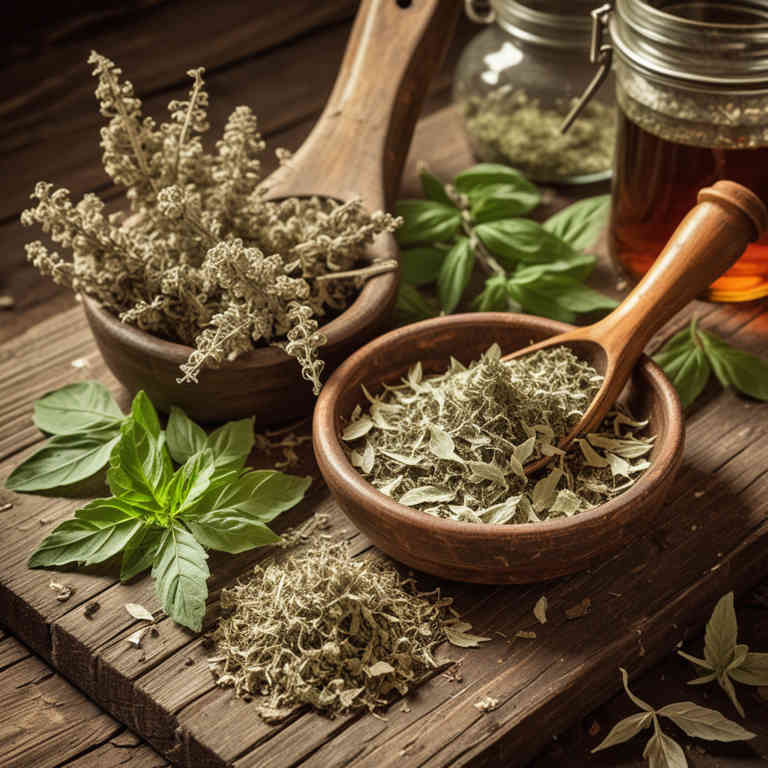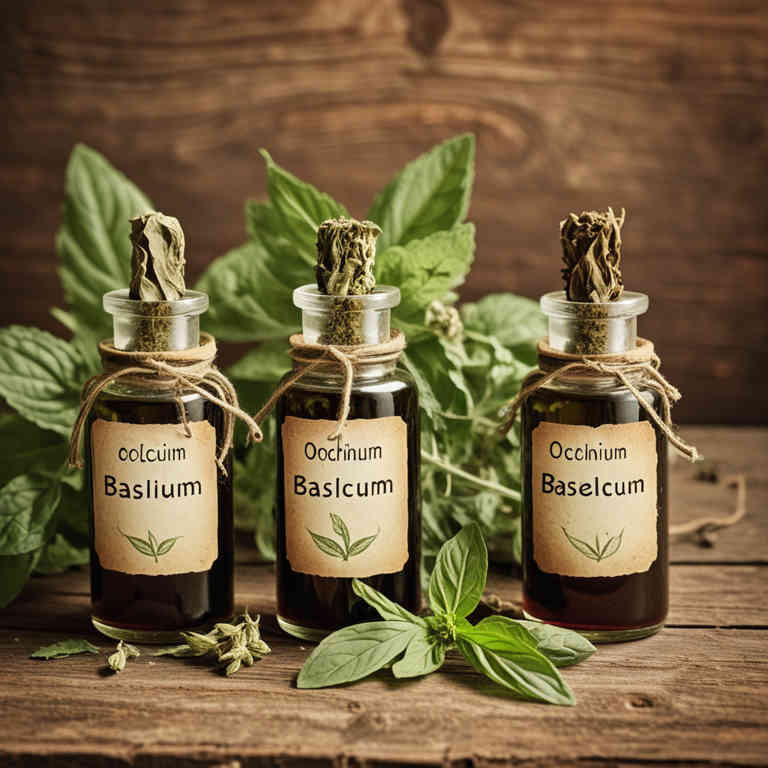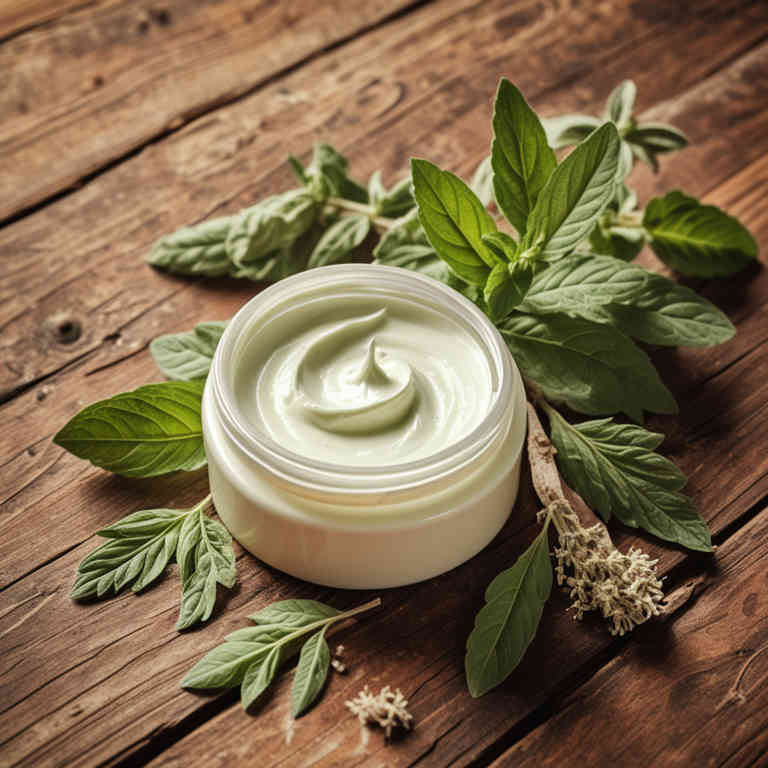10 Best Ocimum Basilicum Preparations

The best medicinal preparations of Ocimum basilicum are teas, decoctions, tinctures, oils, and essential oils, each offering unique benefits for health and wellness.
Herbal teas made from fresh or dried basil leaves are commonly used to soothe digestion and reduce stress.
Decoctions involve simmering the leaves to extract more robust compounds, often used for respiratory or inflammatory conditions.
Tinctures, made by soaking the herb in alcohol, provide a concentrated form for internal or topical use.
Essential oils, extracted through steam distillation, are valued for their aromatic and therapeutic properties in aromatherapy and skin care.
Below there's a list of the 10 best herbal preparations of ocimum basilicum for medicinal purposes.
1. Teas
Ocimum basilicum teas is commonly used to alleviate digestive issues, reduce stress, and promote respiratory health.
The most common medicinal uses of this herbal preparation include treating indigestion, nausea, headaches, and inflammation. It is also used to support immune function and relieve symptoms of colds and flu. The bioactive constituents responsible for its medicinal properties include essential oils like eugenol and methyl chavicol, as well as flavonoids and phenolic acids.
These compounds possess antimicrobial, anti-inflammatory, and antioxidant effects that contribute to its therapeutic benefits.

2. Decoctions
Ocimum basilicum decoctions is commonly used to treat a variety of ailments including digestive issues, stress, and respiratory conditions.
These decoctions are often prepared by boiling the leaves of the basil plant in water to extract its active compounds. The most common medicinal uses include alleviating symptoms of indigestion, reducing anxiety, and easing colds or coughs. Bioactive constituents such as eugenol, rosmarinic acid, and flavonoids contribute to its anti-inflammatory, antimicrobial, and calming effects.
These compounds work together to provide the therapeutic benefits associated with basil decoctions.

3. Tinctures
Ocimum basilicum tinctures is commonly used to treat a variety of ailments including digestive issues, stress, and respiratory conditions.
These tinctures are often employed to alleviate symptoms of indigestion, nausea, and anxiety due to their calming and soothing effects. They are also used to relieve congestion and support immune function during colds and flu. The bioactive constituents responsible for these medicinal properties include essential oils like eugenol, methyl chavicol, and limonene, as well as flavonoids and phenolic acids.
These compounds contribute to the anti-inflammatory, antioxidant, and antimicrobial effects of the tinctures.

4. Oils
Ocimum basilicum oils is commonly used to treat a variety of ailments, including digestive issues, stress, and respiratory conditions.
It is widely recognized for its ability to alleviate symptoms of indigestion, nausea, and bloating due to its carminative properties. The oil is also used in aromatherapy to reduce anxiety and improve mood, thanks to its calming and uplifting effects. Common bioactive constituents include essential oils like eugenol, linalool, and methyl chavicol, which contribute to its anti-inflammatory, antimicrobial, and antioxidant properties.
These compounds work synergistically to provide the oil's broad range of medicinal benefits.

6. Creams
Ocimum basilicum creams is commonly used to treat skin conditions and promote healing due to the plant's natural anti-inflammatory and antimicrobial properties.
These creams are often applied for ailments such as eczema, psoriasis, and minor burns, as well as for relieving muscle pain and inflammation. The most common medicinal uses include soothing skin irritations, reducing inflammation, and supporting wound healing. The bioactive constituents responsible for these effects include essential oils like eugenol, rosmarinic acid, and flavonoids, which have antioxidant, anti-inflammatory, and antimicrobial properties.
These compounds work together to provide the therapeutic benefits associated with Ocimum basilicum in topical preparations.

7. Capsules
Ocimum basilicum capsules is commonly used to support digestive health, alleviate stress, and reduce inflammation.
These capsules are often used to treat ailments such as indigestion, anxiety, and skin conditions like acne. The bioactive constituents responsible for these effects include essential oils like eugenol, rosmarinic acid, and flavonoids, which possess antimicrobial, antioxidant, and anti-inflammatory properties. Additionally, the presence of vitamins and minerals such as vitamin K and manganese contributes to its therapeutic value.
Ocimum basilicum capsules are also believed to enhance cognitive function and promote overall well-being.

8. Lozenges
Ocimum basilicum lozenges is commonly used to alleviate symptoms of respiratory tract infections, such as sore throat, cough, and bronchitis.
These lozenges are often made by infusing fresh or dried basil leaves in a sugar or honey base, allowing for easy consumption. The most common medicinal uses of this preparation include treating sore throats, reducing inflammation, and easing cold symptoms due to its antimicrobial and anti-inflammatory properties. The bioactive constituents responsible for these effects include essential oils like eugenol, rosmarinic acid, and flavonoids, which have antioxidant, antiseptic, and anti-inflammatory actions.
These compounds help soothe mucous membranes and combat pathogens, making basil lozenges a popular natural remedy.

9. Oinments
Ocimum basilicum oinments is commonly used to treat various inflammatory conditions, skin irritations, and minor wounds due to its antimicrobial and anti-inflammatory properties.
These oinments are frequently applied to alleviate symptoms of eczema, psoriasis, and fungal infections. They are also used to reduce pain and swelling associated with arthritis and other musculoskeletal disorders. The bioactive constituents responsible for these effects include essential oils such as eugenol, rosmarinic acid, and flavonoids, which possess antioxidant, anti-inflammatory, and antimicrobial activities.
Additionally, the presence of vitamins and phenolic compounds contributes to its therapeutic value in promoting skin healing and immune support.

10. Syrups
Ocimum basilicum syrups is commonly used to treat respiratory conditions, digestive issues, and to promote relaxation and stress relief.
These syrups are often employed for alleviating symptoms of coughs, colds, and bronchitis due to their expectorant and antimicrobial properties. They are also used to soothe nausea, aid digestion, and reduce inflammation in the gastrointestinal tract. The bioactive constituents responsible for these effects include essential oils like eugenol and methyl chavicol, as well as flavonoids and rosmarinic acid, which possess antioxidant, anti-inflammatory, and antimicrobial activities.
Additionally, the presence of phenolic compounds contributes to its ability to support immune function and reduce oxidative stress in the body.
